Leadership and Management: Organisational Behaviour Report - TESCO
VerifiedAdded on 2023/01/19
|20
|6697
|74
Report
AI Summary
This report provides a comprehensive analysis of organisational behaviour within TESCO. It begins by evaluating the influence of organisational politics, power, and culture on individual and team behaviour, referencing Handy's Typology and Raven's power types. The report then assesses how content and process theories, specifically Maslow's Hierarchy of Needs, can aid in achieving organisational objectives. Furthermore, it explores measures contributing to team effectiveness and ineffectiveness, along with relevant team and group development theories. Finally, the report applies various philosophies and concepts related to organisational behaviour, offering a critique of their impact. The conclusion summarizes the key findings, emphasizing the importance of positive organisational practices for employee motivation and overall performance. The report aims to provide insights into how TESCO can optimize its organisational behaviour strategies for improved outcomes.
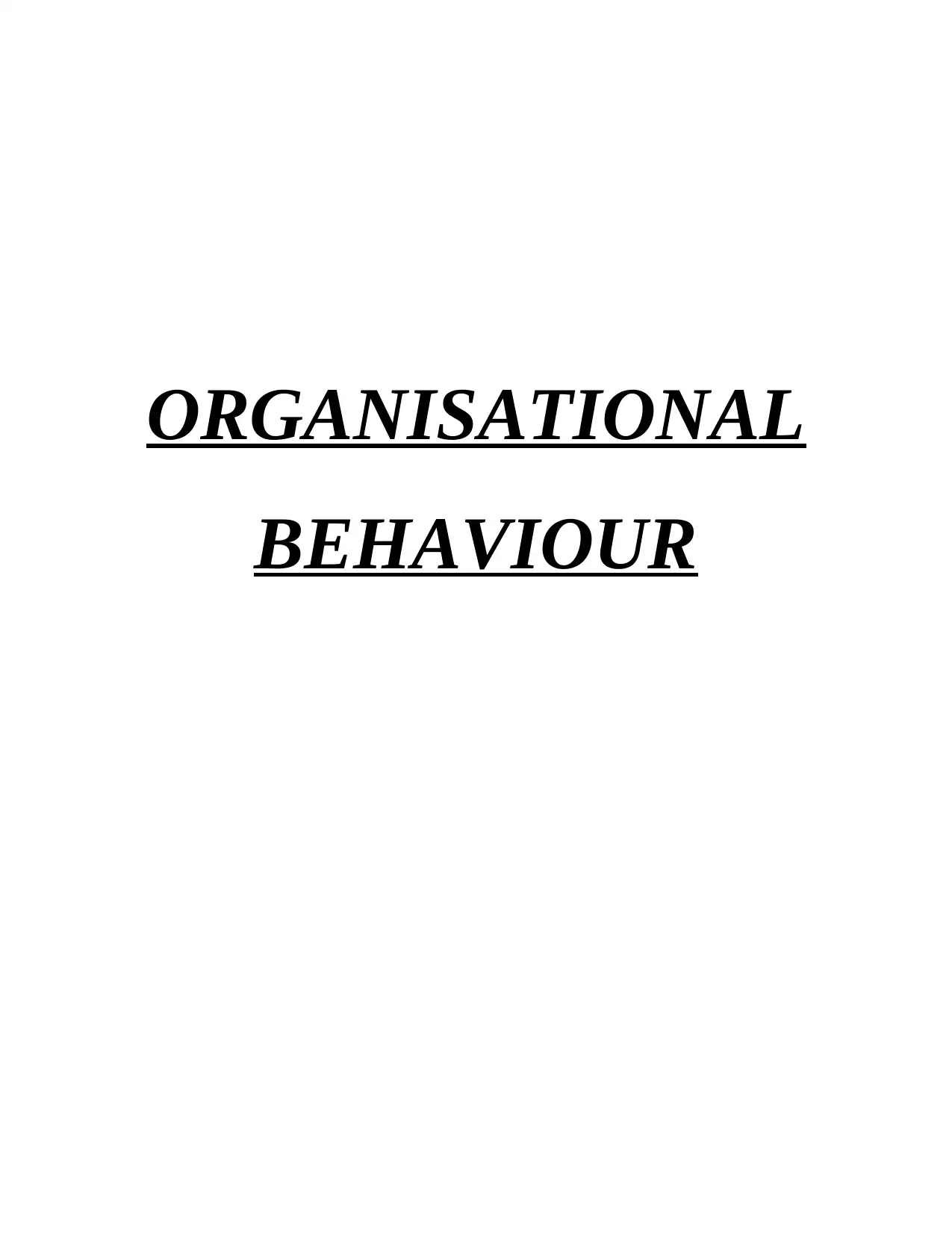
ORGANISATIONAL
BEHAVIOUR
BEHAVIOUR
Paraphrase This Document
Need a fresh take? Get an instant paraphrase of this document with our AI Paraphraser
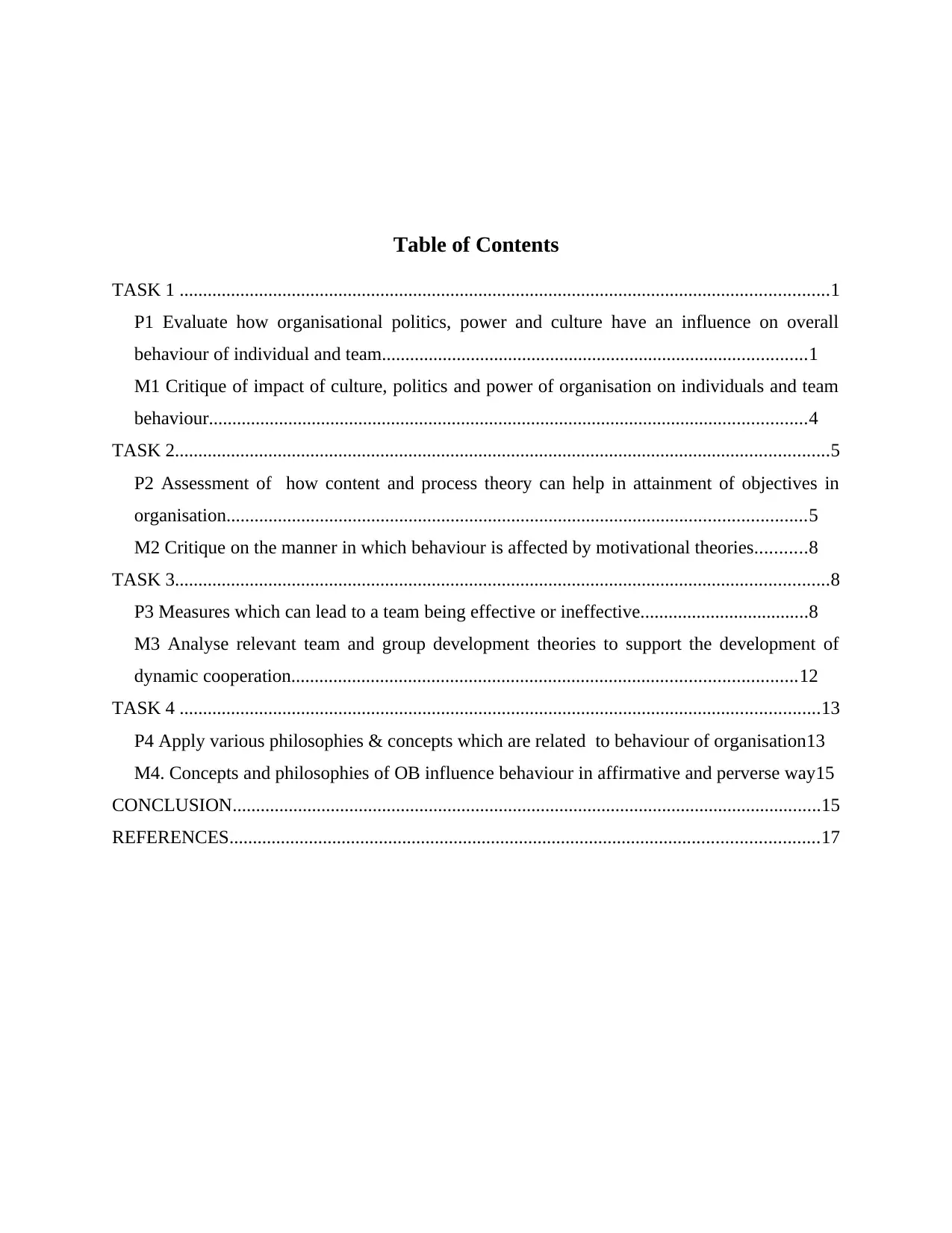
Table of Contents
TASK 1 ...........................................................................................................................................1
P1 Evaluate how organisational politics, power and culture have an influence on overall
behaviour of individual and team...........................................................................................1
M1 Critique of impact of culture, politics and power of organisation on individuals and team
behaviour................................................................................................................................4
TASK 2............................................................................................................................................5
P2 Assessment of how content and process theory can help in attainment of objectives in
organisation............................................................................................................................5
M2 Critique on the manner in which behaviour is affected by motivational theories...........8
TASK 3............................................................................................................................................8
P3 Measures which can lead to a team being effective or ineffective....................................8
M3 Analyse relevant team and group development theories to support the development of
dynamic cooperation............................................................................................................12
TASK 4 .........................................................................................................................................13
P4 Apply various philosophies & concepts which are related to behaviour of organisation13
M4. Concepts and philosophies of OB influence behaviour in affirmative and perverse way15
CONCLUSION..............................................................................................................................15
REFERENCES..............................................................................................................................17
TASK 1 ...........................................................................................................................................1
P1 Evaluate how organisational politics, power and culture have an influence on overall
behaviour of individual and team...........................................................................................1
M1 Critique of impact of culture, politics and power of organisation on individuals and team
behaviour................................................................................................................................4
TASK 2............................................................................................................................................5
P2 Assessment of how content and process theory can help in attainment of objectives in
organisation............................................................................................................................5
M2 Critique on the manner in which behaviour is affected by motivational theories...........8
TASK 3............................................................................................................................................8
P3 Measures which can lead to a team being effective or ineffective....................................8
M3 Analyse relevant team and group development theories to support the development of
dynamic cooperation............................................................................................................12
TASK 4 .........................................................................................................................................13
P4 Apply various philosophies & concepts which are related to behaviour of organisation13
M4. Concepts and philosophies of OB influence behaviour in affirmative and perverse way15
CONCLUSION..............................................................................................................................15
REFERENCES..............................................................................................................................17

⊘ This is a preview!⊘
Do you want full access?
Subscribe today to unlock all pages.

Trusted by 1+ million students worldwide
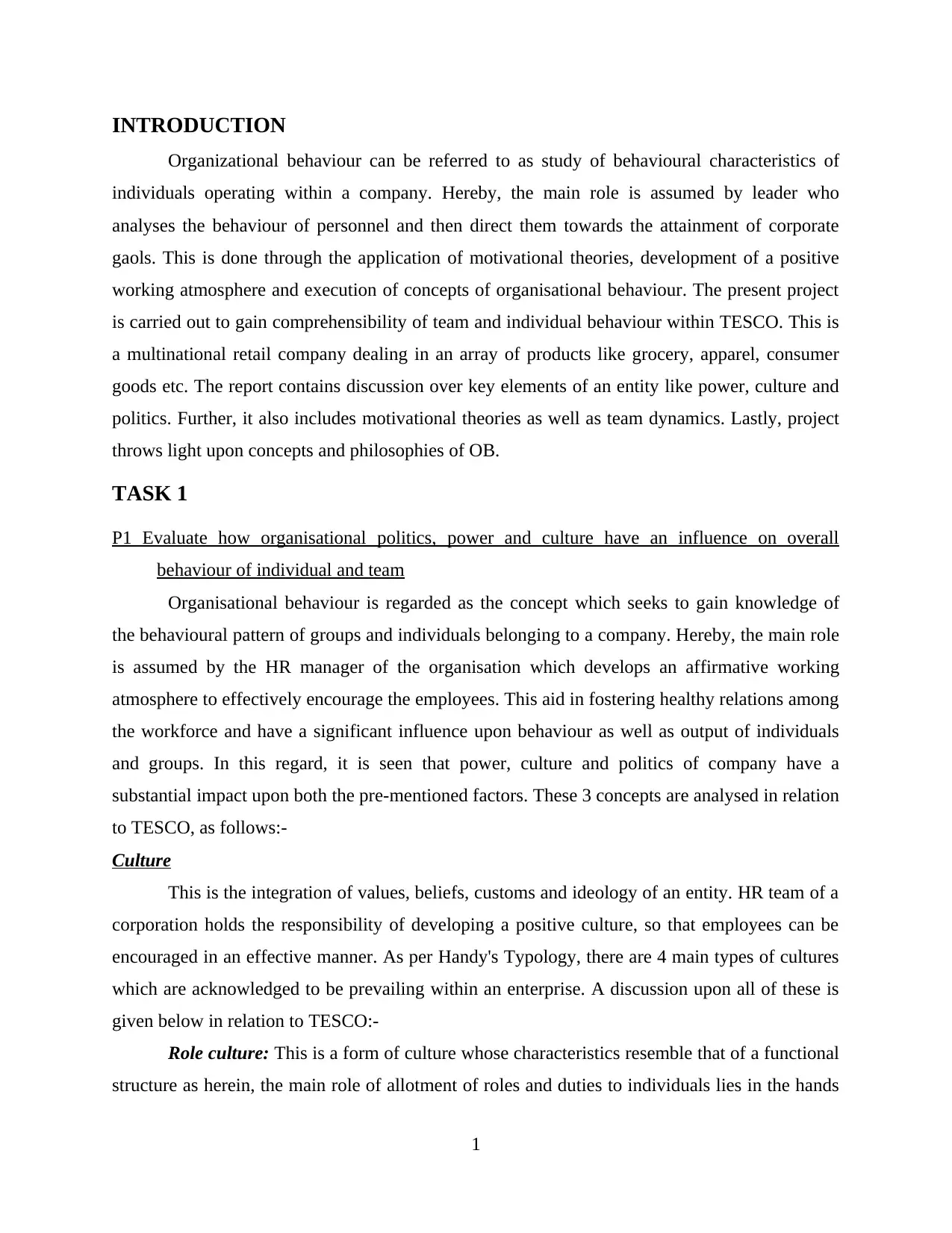
INTRODUCTION
Organizational behaviour can be referred to as study of behavioural characteristics of
individuals operating within a company. Hereby, the main role is assumed by leader who
analyses the behaviour of personnel and then direct them towards the attainment of corporate
gaols. This is done through the application of motivational theories, development of a positive
working atmosphere and execution of concepts of organisational behaviour. The present project
is carried out to gain comprehensibility of team and individual behaviour within TESCO. This is
a multinational retail company dealing in an array of products like grocery, apparel, consumer
goods etc. The report contains discussion over key elements of an entity like power, culture and
politics. Further, it also includes motivational theories as well as team dynamics. Lastly, project
throws light upon concepts and philosophies of OB.
TASK 1
P1 Evaluate how organisational politics, power and culture have an influence on overall
behaviour of individual and team
Organisational behaviour is regarded as the concept which seeks to gain knowledge of
the behavioural pattern of groups and individuals belonging to a company. Hereby, the main role
is assumed by the HR manager of the organisation which develops an affirmative working
atmosphere to effectively encourage the employees. This aid in fostering healthy relations among
the workforce and have a significant influence upon behaviour as well as output of individuals
and groups. In this regard, it is seen that power, culture and politics of company have a
substantial impact upon both the pre-mentioned factors. These 3 concepts are analysed in relation
to TESCO, as follows:-
Culture
This is the integration of values, beliefs, customs and ideology of an entity. HR team of a
corporation holds the responsibility of developing a positive culture, so that employees can be
encouraged in an effective manner. As per Handy's Typology, there are 4 main types of cultures
which are acknowledged to be prevailing within an enterprise. A discussion upon all of these is
given below in relation to TESCO:-
Role culture: This is a form of culture whose characteristics resemble that of a functional
structure as herein, the main role of allotment of roles and duties to individuals lies in the hands
1
Organizational behaviour can be referred to as study of behavioural characteristics of
individuals operating within a company. Hereby, the main role is assumed by leader who
analyses the behaviour of personnel and then direct them towards the attainment of corporate
gaols. This is done through the application of motivational theories, development of a positive
working atmosphere and execution of concepts of organisational behaviour. The present project
is carried out to gain comprehensibility of team and individual behaviour within TESCO. This is
a multinational retail company dealing in an array of products like grocery, apparel, consumer
goods etc. The report contains discussion over key elements of an entity like power, culture and
politics. Further, it also includes motivational theories as well as team dynamics. Lastly, project
throws light upon concepts and philosophies of OB.
TASK 1
P1 Evaluate how organisational politics, power and culture have an influence on overall
behaviour of individual and team
Organisational behaviour is regarded as the concept which seeks to gain knowledge of
the behavioural pattern of groups and individuals belonging to a company. Hereby, the main role
is assumed by the HR manager of the organisation which develops an affirmative working
atmosphere to effectively encourage the employees. This aid in fostering healthy relations among
the workforce and have a significant influence upon behaviour as well as output of individuals
and groups. In this regard, it is seen that power, culture and politics of company have a
substantial impact upon both the pre-mentioned factors. These 3 concepts are analysed in relation
to TESCO, as follows:-
Culture
This is the integration of values, beliefs, customs and ideology of an entity. HR team of a
corporation holds the responsibility of developing a positive culture, so that employees can be
encouraged in an effective manner. As per Handy's Typology, there are 4 main types of cultures
which are acknowledged to be prevailing within an enterprise. A discussion upon all of these is
given below in relation to TESCO:-
Role culture: This is a form of culture whose characteristics resemble that of a functional
structure as herein, the main role of allotment of roles and duties to individuals lies in the hands
1
Paraphrase This Document
Need a fresh take? Get an instant paraphrase of this document with our AI Paraphraser
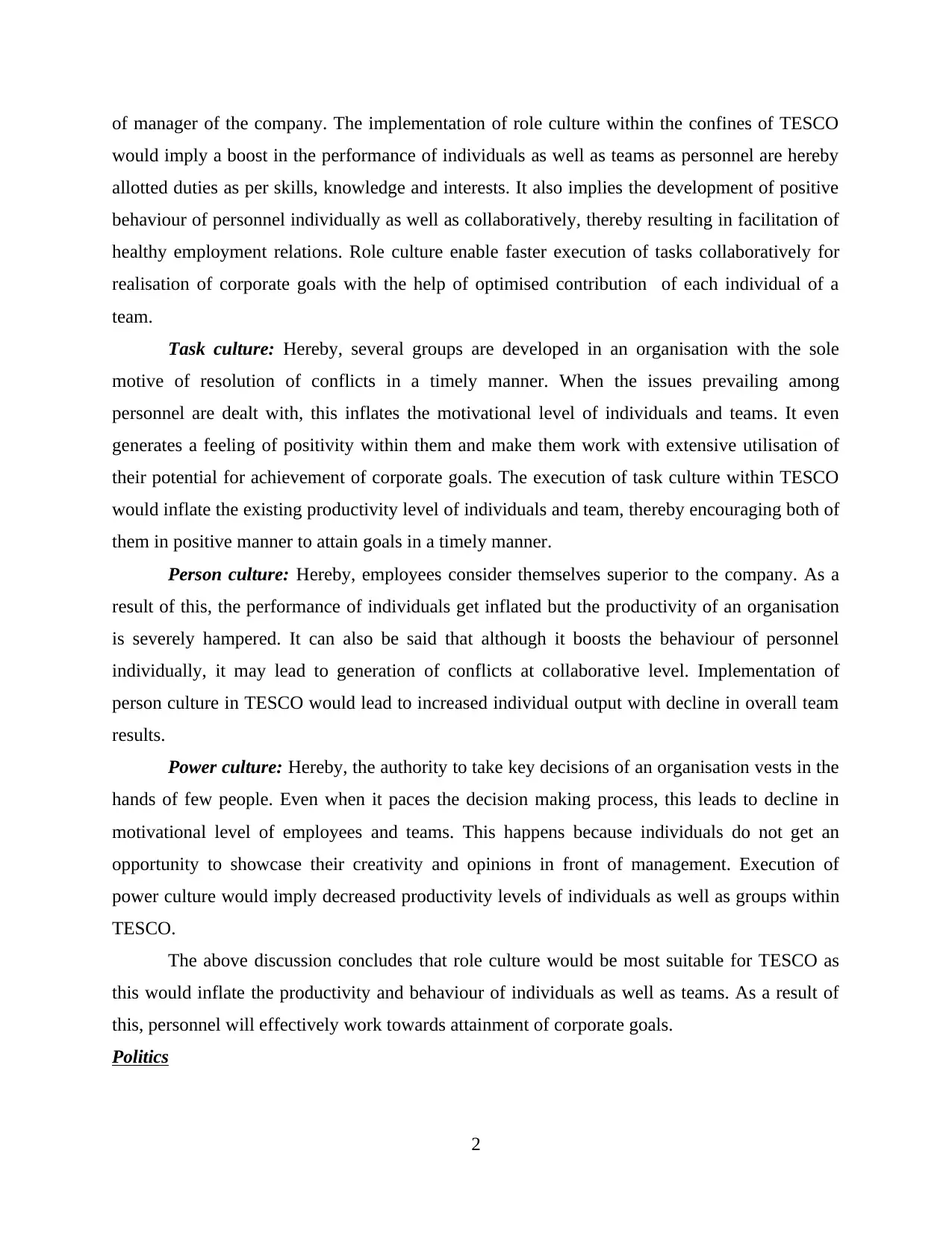
of manager of the company. The implementation of role culture within the confines of TESCO
would imply a boost in the performance of individuals as well as teams as personnel are hereby
allotted duties as per skills, knowledge and interests. It also implies the development of positive
behaviour of personnel individually as well as collaboratively, thereby resulting in facilitation of
healthy employment relations. Role culture enable faster execution of tasks collaboratively for
realisation of corporate goals with the help of optimised contribution of each individual of a
team.
Task culture: Hereby, several groups are developed in an organisation with the sole
motive of resolution of conflicts in a timely manner. When the issues prevailing among
personnel are dealt with, this inflates the motivational level of individuals and teams. It even
generates a feeling of positivity within them and make them work with extensive utilisation of
their potential for achievement of corporate goals. The execution of task culture within TESCO
would inflate the existing productivity level of individuals and team, thereby encouraging both of
them in positive manner to attain goals in a timely manner.
Person culture: Hereby, employees consider themselves superior to the company. As a
result of this, the performance of individuals get inflated but the productivity of an organisation
is severely hampered. It can also be said that although it boosts the behaviour of personnel
individually, it may lead to generation of conflicts at collaborative level. Implementation of
person culture in TESCO would lead to increased individual output with decline in overall team
results.
Power culture: Hereby, the authority to take key decisions of an organisation vests in the
hands of few people. Even when it paces the decision making process, this leads to decline in
motivational level of employees and teams. This happens because individuals do not get an
opportunity to showcase their creativity and opinions in front of management. Execution of
power culture would imply decreased productivity levels of individuals as well as groups within
TESCO.
The above discussion concludes that role culture would be most suitable for TESCO as
this would inflate the productivity and behaviour of individuals as well as teams. As a result of
this, personnel will effectively work towards attainment of corporate goals.
Politics
2
would imply a boost in the performance of individuals as well as teams as personnel are hereby
allotted duties as per skills, knowledge and interests. It also implies the development of positive
behaviour of personnel individually as well as collaboratively, thereby resulting in facilitation of
healthy employment relations. Role culture enable faster execution of tasks collaboratively for
realisation of corporate goals with the help of optimised contribution of each individual of a
team.
Task culture: Hereby, several groups are developed in an organisation with the sole
motive of resolution of conflicts in a timely manner. When the issues prevailing among
personnel are dealt with, this inflates the motivational level of individuals and teams. It even
generates a feeling of positivity within them and make them work with extensive utilisation of
their potential for achievement of corporate goals. The execution of task culture within TESCO
would inflate the existing productivity level of individuals and team, thereby encouraging both of
them in positive manner to attain goals in a timely manner.
Person culture: Hereby, employees consider themselves superior to the company. As a
result of this, the performance of individuals get inflated but the productivity of an organisation
is severely hampered. It can also be said that although it boosts the behaviour of personnel
individually, it may lead to generation of conflicts at collaborative level. Implementation of
person culture in TESCO would lead to increased individual output with decline in overall team
results.
Power culture: Hereby, the authority to take key decisions of an organisation vests in the
hands of few people. Even when it paces the decision making process, this leads to decline in
motivational level of employees and teams. This happens because individuals do not get an
opportunity to showcase their creativity and opinions in front of management. Execution of
power culture would imply decreased productivity levels of individuals as well as groups within
TESCO.
The above discussion concludes that role culture would be most suitable for TESCO as
this would inflate the productivity and behaviour of individuals as well as teams. As a result of
this, personnel will effectively work towards attainment of corporate goals.
Politics
2
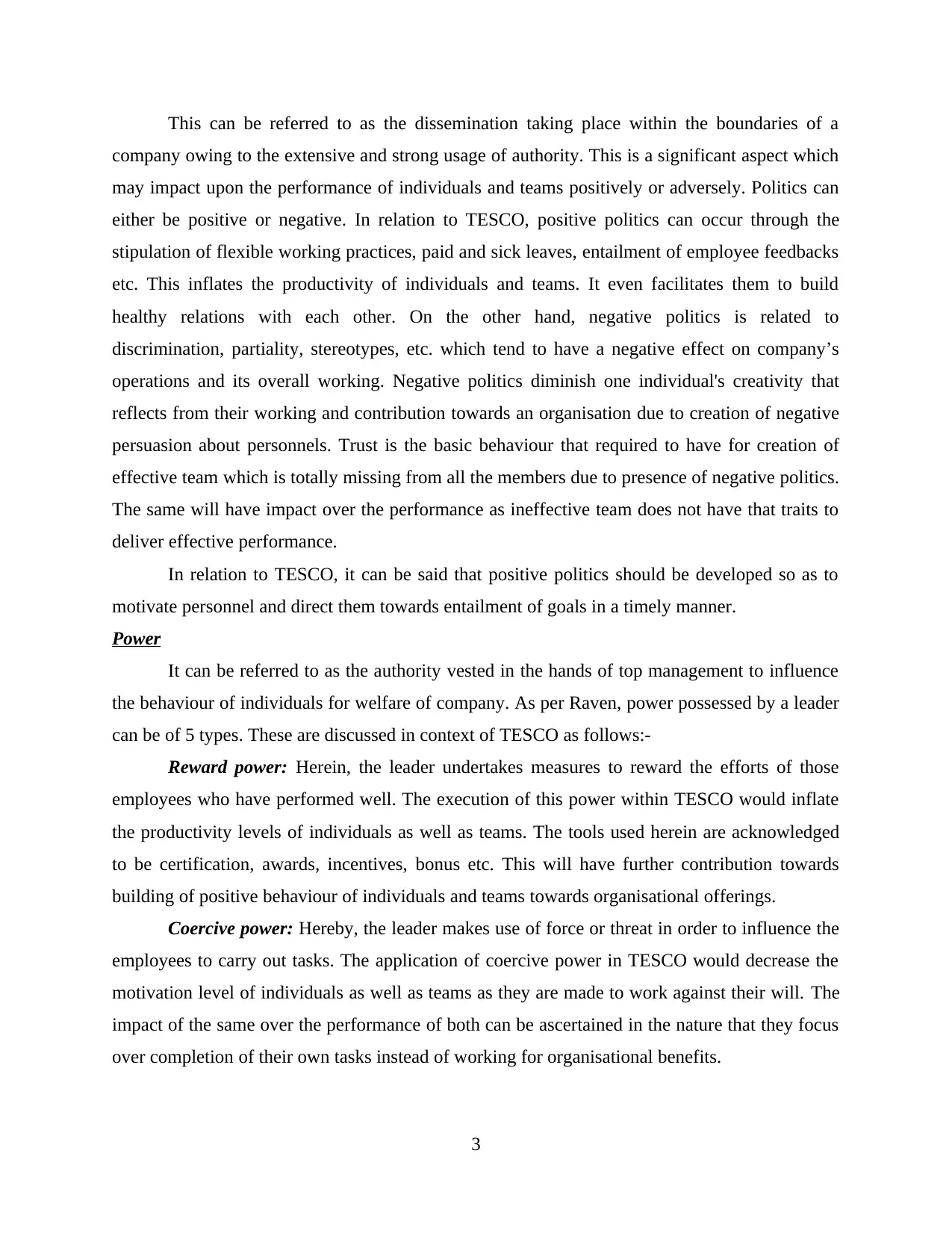
This can be referred to as the dissemination taking place within the boundaries of a
company owing to the extensive and strong usage of authority. This is a significant aspect which
may impact upon the performance of individuals and teams positively or adversely. Politics can
either be positive or negative. In relation to TESCO, positive politics can occur through the
stipulation of flexible working practices, paid and sick leaves, entailment of employee feedbacks
etc. This inflates the productivity of individuals and teams. It even facilitates them to build
healthy relations with each other. On the other hand, negative politics is related to
discrimination, partiality, stereotypes, etc. which tend to have a negative effect on company’s
operations and its overall working. Negative politics diminish one individual's creativity that
reflects from their working and contribution towards an organisation due to creation of negative
persuasion about personnels. Trust is the basic behaviour that required to have for creation of
effective team which is totally missing from all the members due to presence of negative politics.
The same will have impact over the performance as ineffective team does not have that traits to
deliver effective performance.
In relation to TESCO, it can be said that positive politics should be developed so as to
motivate personnel and direct them towards entailment of goals in a timely manner.
Power
It can be referred to as the authority vested in the hands of top management to influence
the behaviour of individuals for welfare of company. As per Raven, power possessed by a leader
can be of 5 types. These are discussed in context of TESCO as follows:-
Reward power: Herein, the leader undertakes measures to reward the efforts of those
employees who have performed well. The execution of this power within TESCO would inflate
the productivity levels of individuals as well as teams. The tools used herein are acknowledged
to be certification, awards, incentives, bonus etc. This will have further contribution towards
building of positive behaviour of individuals and teams towards organisational offerings.
Coercive power: Hereby, the leader makes use of force or threat in order to influence the
employees to carry out tasks. The application of coercive power in TESCO would decrease the
motivation level of individuals as well as teams as they are made to work against their will. The
impact of the same over the performance of both can be ascertained in the nature that they focus
over completion of their own tasks instead of working for organisational benefits.
3
company owing to the extensive and strong usage of authority. This is a significant aspect which
may impact upon the performance of individuals and teams positively or adversely. Politics can
either be positive or negative. In relation to TESCO, positive politics can occur through the
stipulation of flexible working practices, paid and sick leaves, entailment of employee feedbacks
etc. This inflates the productivity of individuals and teams. It even facilitates them to build
healthy relations with each other. On the other hand, negative politics is related to
discrimination, partiality, stereotypes, etc. which tend to have a negative effect on company’s
operations and its overall working. Negative politics diminish one individual's creativity that
reflects from their working and contribution towards an organisation due to creation of negative
persuasion about personnels. Trust is the basic behaviour that required to have for creation of
effective team which is totally missing from all the members due to presence of negative politics.
The same will have impact over the performance as ineffective team does not have that traits to
deliver effective performance.
In relation to TESCO, it can be said that positive politics should be developed so as to
motivate personnel and direct them towards entailment of goals in a timely manner.
Power
It can be referred to as the authority vested in the hands of top management to influence
the behaviour of individuals for welfare of company. As per Raven, power possessed by a leader
can be of 5 types. These are discussed in context of TESCO as follows:-
Reward power: Herein, the leader undertakes measures to reward the efforts of those
employees who have performed well. The execution of this power within TESCO would inflate
the productivity levels of individuals as well as teams. The tools used herein are acknowledged
to be certification, awards, incentives, bonus etc. This will have further contribution towards
building of positive behaviour of individuals and teams towards organisational offerings.
Coercive power: Hereby, the leader makes use of force or threat in order to influence the
employees to carry out tasks. The application of coercive power in TESCO would decrease the
motivation level of individuals as well as teams as they are made to work against their will. The
impact of the same over the performance of both can be ascertained in the nature that they focus
over completion of their own tasks instead of working for organisational benefits.
3
⊘ This is a preview!⊘
Do you want full access?
Subscribe today to unlock all pages.

Trusted by 1+ million students worldwide
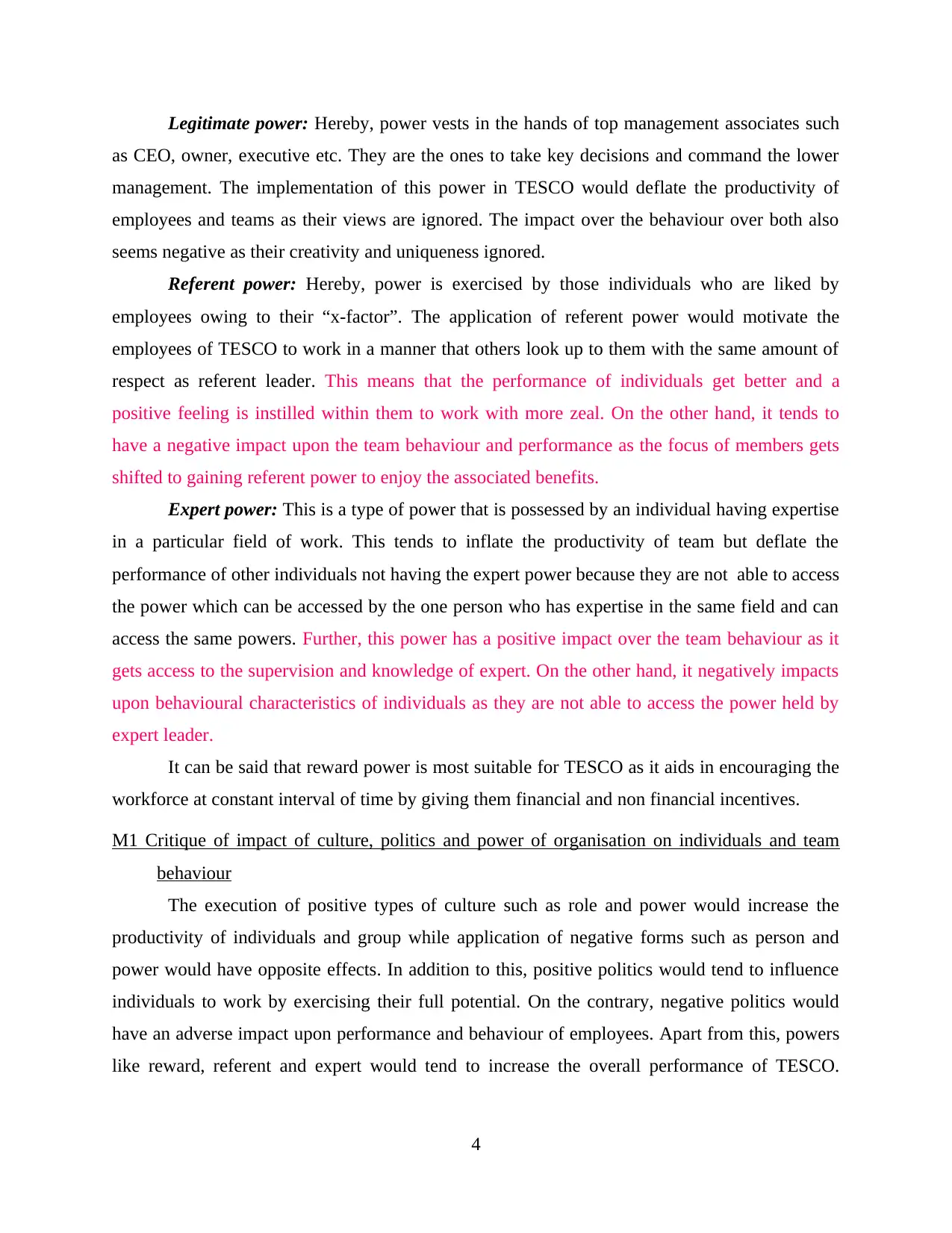
Legitimate power: Hereby, power vests in the hands of top management associates such
as CEO, owner, executive etc. They are the ones to take key decisions and command the lower
management. The implementation of this power in TESCO would deflate the productivity of
employees and teams as their views are ignored. The impact over the behaviour over both also
seems negative as their creativity and uniqueness ignored.
Referent power: Hereby, power is exercised by those individuals who are liked by
employees owing to their “x-factor”. The application of referent power would motivate the
employees of TESCO to work in a manner that others look up to them with the same amount of
respect as referent leader. This means that the performance of individuals get better and a
positive feeling is instilled within them to work with more zeal. On the other hand, it tends to
have a negative impact upon the team behaviour and performance as the focus of members gets
shifted to gaining referent power to enjoy the associated benefits.
Expert power: This is a type of power that is possessed by an individual having expertise
in a particular field of work. This tends to inflate the productivity of team but deflate the
performance of other individuals not having the expert power because they are not able to access
the power which can be accessed by the one person who has expertise in the same field and can
access the same powers. Further, this power has a positive impact over the team behaviour as it
gets access to the supervision and knowledge of expert. On the other hand, it negatively impacts
upon behavioural characteristics of individuals as they are not able to access the power held by
expert leader.
It can be said that reward power is most suitable for TESCO as it aids in encouraging the
workforce at constant interval of time by giving them financial and non financial incentives.
M1 Critique of impact of culture, politics and power of organisation on individuals and team
behaviour
The execution of positive types of culture such as role and power would increase the
productivity of individuals and group while application of negative forms such as person and
power would have opposite effects. In addition to this, positive politics would tend to influence
individuals to work by exercising their full potential. On the contrary, negative politics would
have an adverse impact upon performance and behaviour of employees. Apart from this, powers
like reward, referent and expert would tend to increase the overall performance of TESCO.
4
as CEO, owner, executive etc. They are the ones to take key decisions and command the lower
management. The implementation of this power in TESCO would deflate the productivity of
employees and teams as their views are ignored. The impact over the behaviour over both also
seems negative as their creativity and uniqueness ignored.
Referent power: Hereby, power is exercised by those individuals who are liked by
employees owing to their “x-factor”. The application of referent power would motivate the
employees of TESCO to work in a manner that others look up to them with the same amount of
respect as referent leader. This means that the performance of individuals get better and a
positive feeling is instilled within them to work with more zeal. On the other hand, it tends to
have a negative impact upon the team behaviour and performance as the focus of members gets
shifted to gaining referent power to enjoy the associated benefits.
Expert power: This is a type of power that is possessed by an individual having expertise
in a particular field of work. This tends to inflate the productivity of team but deflate the
performance of other individuals not having the expert power because they are not able to access
the power which can be accessed by the one person who has expertise in the same field and can
access the same powers. Further, this power has a positive impact over the team behaviour as it
gets access to the supervision and knowledge of expert. On the other hand, it negatively impacts
upon behavioural characteristics of individuals as they are not able to access the power held by
expert leader.
It can be said that reward power is most suitable for TESCO as it aids in encouraging the
workforce at constant interval of time by giving them financial and non financial incentives.
M1 Critique of impact of culture, politics and power of organisation on individuals and team
behaviour
The execution of positive types of culture such as role and power would increase the
productivity of individuals and group while application of negative forms such as person and
power would have opposite effects. In addition to this, positive politics would tend to influence
individuals to work by exercising their full potential. On the contrary, negative politics would
have an adverse impact upon performance and behaviour of employees. Apart from this, powers
like reward, referent and expert would tend to increase the overall performance of TESCO.
4
Paraphrase This Document
Need a fresh take? Get an instant paraphrase of this document with our AI Paraphraser
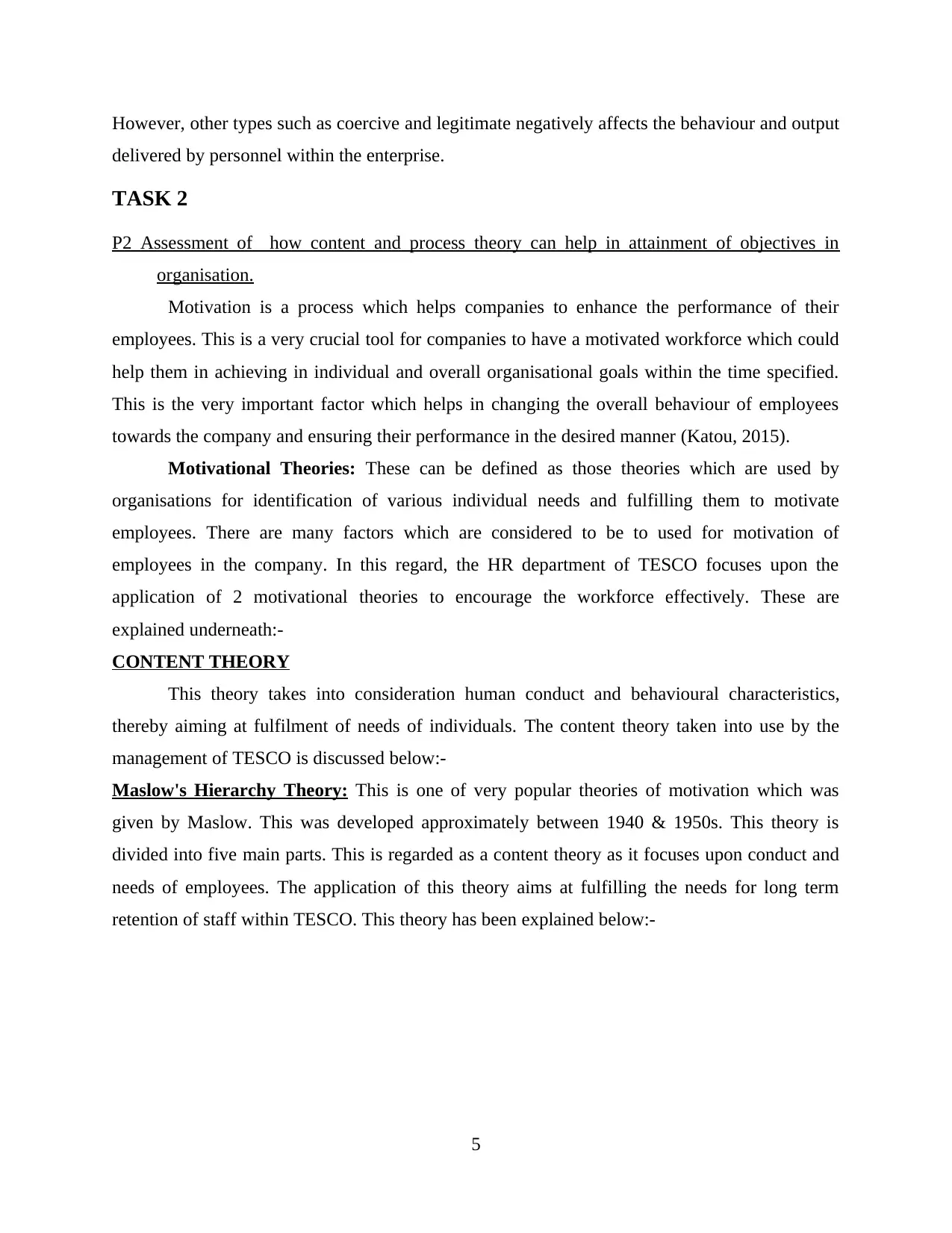
However, other types such as coercive and legitimate negatively affects the behaviour and output
delivered by personnel within the enterprise.
TASK 2
P2 Assessment of how content and process theory can help in attainment of objectives in
organisation.
Motivation is a process which helps companies to enhance the performance of their
employees. This is a very crucial tool for companies to have a motivated workforce which could
help them in achieving in individual and overall organisational goals within the time specified.
This is the very important factor which helps in changing the overall behaviour of employees
towards the company and ensuring their performance in the desired manner (Katou, 2015).
Motivational Theories: These can be defined as those theories which are used by
organisations for identification of various individual needs and fulfilling them to motivate
employees. There are many factors which are considered to be to used for motivation of
employees in the company. In this regard, the HR department of TESCO focuses upon the
application of 2 motivational theories to encourage the workforce effectively. These are
explained underneath:-
CONTENT THEORY
This theory takes into consideration human conduct and behavioural characteristics,
thereby aiming at fulfilment of needs of individuals. The content theory taken into use by the
management of TESCO is discussed below:-
Maslow's Hierarchy Theory: This is one of very popular theories of motivation which was
given by Maslow. This was developed approximately between 1940 & 1950s. This theory is
divided into five main parts. This is regarded as a content theory as it focuses upon conduct and
needs of employees. The application of this theory aims at fulfilling the needs for long term
retention of staff within TESCO. This theory has been explained below:-
5
delivered by personnel within the enterprise.
TASK 2
P2 Assessment of how content and process theory can help in attainment of objectives in
organisation.
Motivation is a process which helps companies to enhance the performance of their
employees. This is a very crucial tool for companies to have a motivated workforce which could
help them in achieving in individual and overall organisational goals within the time specified.
This is the very important factor which helps in changing the overall behaviour of employees
towards the company and ensuring their performance in the desired manner (Katou, 2015).
Motivational Theories: These can be defined as those theories which are used by
organisations for identification of various individual needs and fulfilling them to motivate
employees. There are many factors which are considered to be to used for motivation of
employees in the company. In this regard, the HR department of TESCO focuses upon the
application of 2 motivational theories to encourage the workforce effectively. These are
explained underneath:-
CONTENT THEORY
This theory takes into consideration human conduct and behavioural characteristics,
thereby aiming at fulfilment of needs of individuals. The content theory taken into use by the
management of TESCO is discussed below:-
Maslow's Hierarchy Theory: This is one of very popular theories of motivation which was
given by Maslow. This was developed approximately between 1940 & 1950s. This theory is
divided into five main parts. This is regarded as a content theory as it focuses upon conduct and
needs of employees. The application of this theory aims at fulfilling the needs for long term
retention of staff within TESCO. This theory has been explained below:-
5
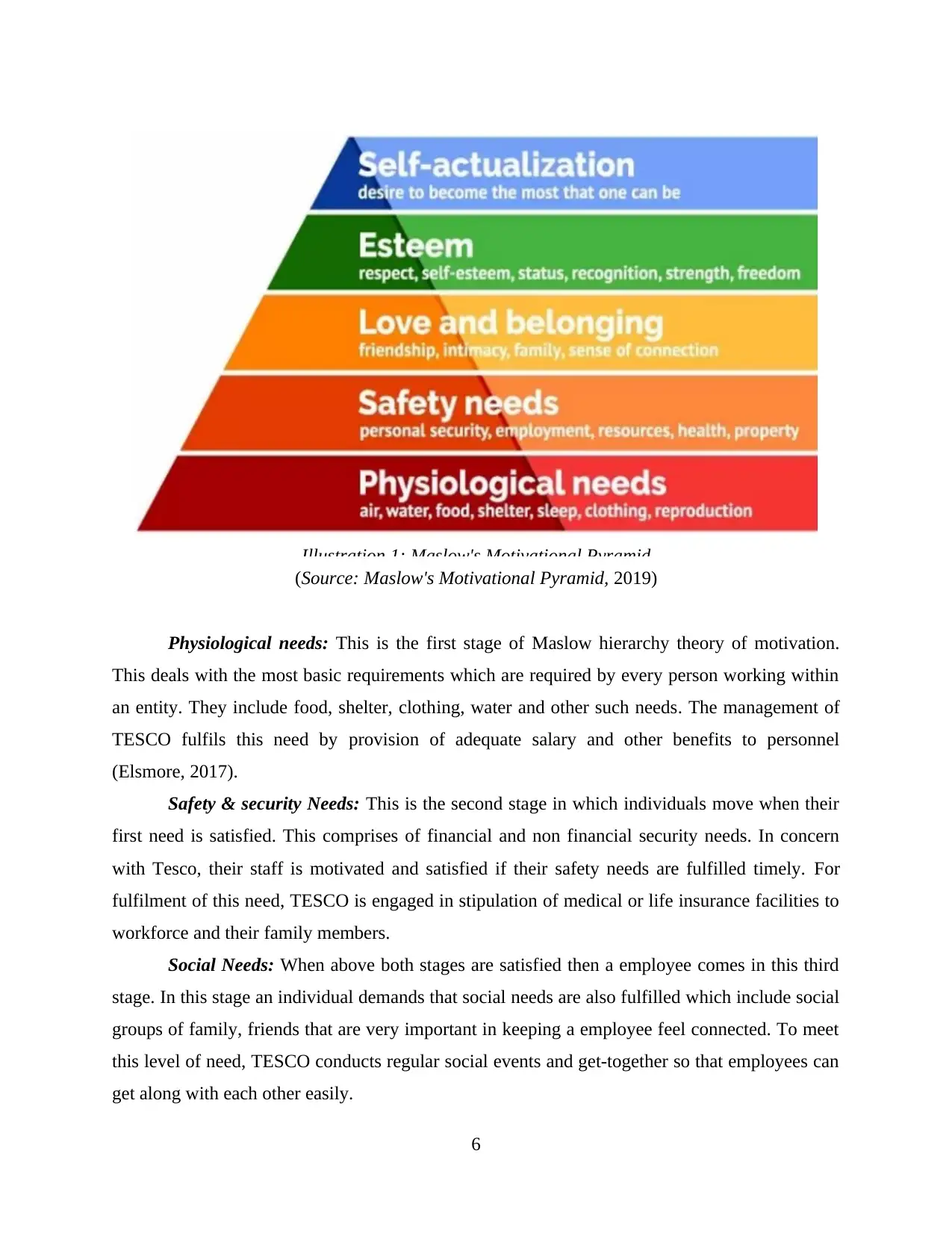
(Source: Maslow's Motivational Pyramid, 2019)
Physiological needs: This is the first stage of Maslow hierarchy theory of motivation.
This deals with the most basic requirements which are required by every person working within
an entity. They include food, shelter, clothing, water and other such needs. The management of
TESCO fulfils this need by provision of adequate salary and other benefits to personnel
(Elsmore, 2017).
Safety & security Needs: This is the second stage in which individuals move when their
first need is satisfied. This comprises of financial and non financial security needs. In concern
with Tesco, their staff is motivated and satisfied if their safety needs are fulfilled timely. For
fulfilment of this need, TESCO is engaged in stipulation of medical or life insurance facilities to
workforce and their family members.
Social Needs: When above both stages are satisfied then a employee comes in this third
stage. In this stage an individual demands that social needs are also fulfilled which include social
groups of family, friends that are very important in keeping a employee feel connected. To meet
this level of need, TESCO conducts regular social events and get-together so that employees can
get along with each other easily.
6
Illustration 1: Maslow's Motivational Pyramid
Physiological needs: This is the first stage of Maslow hierarchy theory of motivation.
This deals with the most basic requirements which are required by every person working within
an entity. They include food, shelter, clothing, water and other such needs. The management of
TESCO fulfils this need by provision of adequate salary and other benefits to personnel
(Elsmore, 2017).
Safety & security Needs: This is the second stage in which individuals move when their
first need is satisfied. This comprises of financial and non financial security needs. In concern
with Tesco, their staff is motivated and satisfied if their safety needs are fulfilled timely. For
fulfilment of this need, TESCO is engaged in stipulation of medical or life insurance facilities to
workforce and their family members.
Social Needs: When above both stages are satisfied then a employee comes in this third
stage. In this stage an individual demands that social needs are also fulfilled which include social
groups of family, friends that are very important in keeping a employee feel connected. To meet
this level of need, TESCO conducts regular social events and get-together so that employees can
get along with each other easily.
6
Illustration 1: Maslow's Motivational Pyramid
⊘ This is a preview!⊘
Do you want full access?
Subscribe today to unlock all pages.

Trusted by 1+ million students worldwide
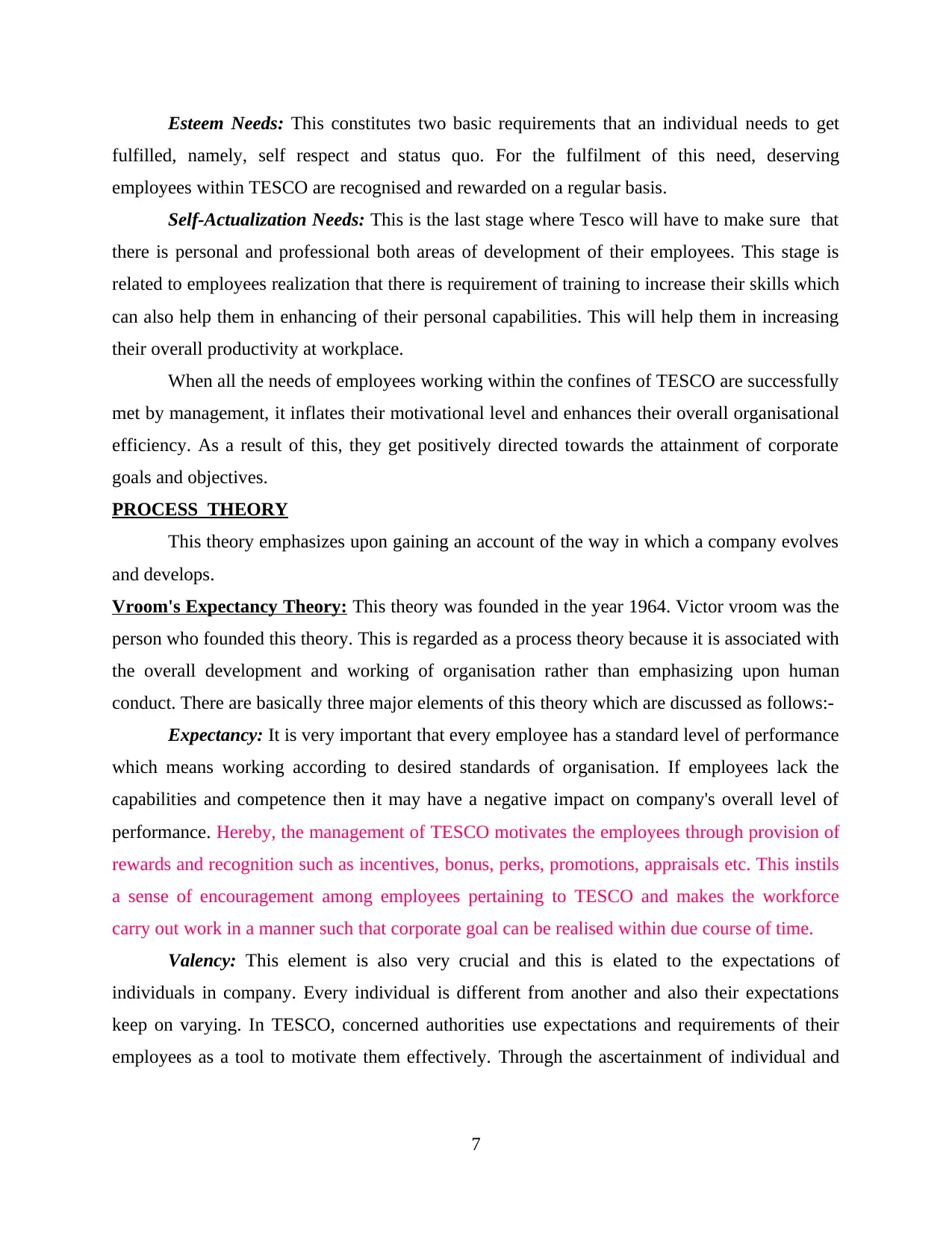
Esteem Needs: This constitutes two basic requirements that an individual needs to get
fulfilled, namely, self respect and status quo. For the fulfilment of this need, deserving
employees within TESCO are recognised and rewarded on a regular basis.
Self-Actualization Needs: This is the last stage where Tesco will have to make sure that
there is personal and professional both areas of development of their employees. This stage is
related to employees realization that there is requirement of training to increase their skills which
can also help them in enhancing of their personal capabilities. This will help them in increasing
their overall productivity at workplace.
When all the needs of employees working within the confines of TESCO are successfully
met by management, it inflates their motivational level and enhances their overall organisational
efficiency. As a result of this, they get positively directed towards the attainment of corporate
goals and objectives.
PROCESS THEORY
This theory emphasizes upon gaining an account of the way in which a company evolves
and develops.
Vroom's Expectancy Theory: This theory was founded in the year 1964. Victor vroom was the
person who founded this theory. This is regarded as a process theory because it is associated with
the overall development and working of organisation rather than emphasizing upon human
conduct. There are basically three major elements of this theory which are discussed as follows:-
Expectancy: It is very important that every employee has a standard level of performance
which means working according to desired standards of organisation. If employees lack the
capabilities and competence then it may have a negative impact on company's overall level of
performance. Hereby, the management of TESCO motivates the employees through provision of
rewards and recognition such as incentives, bonus, perks, promotions, appraisals etc. This instils
a sense of encouragement among employees pertaining to TESCO and makes the workforce
carry out work in a manner such that corporate goal can be realised within due course of time.
Valency: This element is also very crucial and this is elated to the expectations of
individuals in company. Every individual is different from another and also their expectations
keep on varying. In TESCO, concerned authorities use expectations and requirements of their
employees as a tool to motivate them effectively. Through the ascertainment of individual and
7
fulfilled, namely, self respect and status quo. For the fulfilment of this need, deserving
employees within TESCO are recognised and rewarded on a regular basis.
Self-Actualization Needs: This is the last stage where Tesco will have to make sure that
there is personal and professional both areas of development of their employees. This stage is
related to employees realization that there is requirement of training to increase their skills which
can also help them in enhancing of their personal capabilities. This will help them in increasing
their overall productivity at workplace.
When all the needs of employees working within the confines of TESCO are successfully
met by management, it inflates their motivational level and enhances their overall organisational
efficiency. As a result of this, they get positively directed towards the attainment of corporate
goals and objectives.
PROCESS THEORY
This theory emphasizes upon gaining an account of the way in which a company evolves
and develops.
Vroom's Expectancy Theory: This theory was founded in the year 1964. Victor vroom was the
person who founded this theory. This is regarded as a process theory because it is associated with
the overall development and working of organisation rather than emphasizing upon human
conduct. There are basically three major elements of this theory which are discussed as follows:-
Expectancy: It is very important that every employee has a standard level of performance
which means working according to desired standards of organisation. If employees lack the
capabilities and competence then it may have a negative impact on company's overall level of
performance. Hereby, the management of TESCO motivates the employees through provision of
rewards and recognition such as incentives, bonus, perks, promotions, appraisals etc. This instils
a sense of encouragement among employees pertaining to TESCO and makes the workforce
carry out work in a manner such that corporate goal can be realised within due course of time.
Valency: This element is also very crucial and this is elated to the expectations of
individuals in company. Every individual is different from another and also their expectations
keep on varying. In TESCO, concerned authorities use expectations and requirements of their
employees as a tool to motivate them effectively. Through the ascertainment of individual and
7
Paraphrase This Document
Need a fresh take? Get an instant paraphrase of this document with our AI Paraphraser
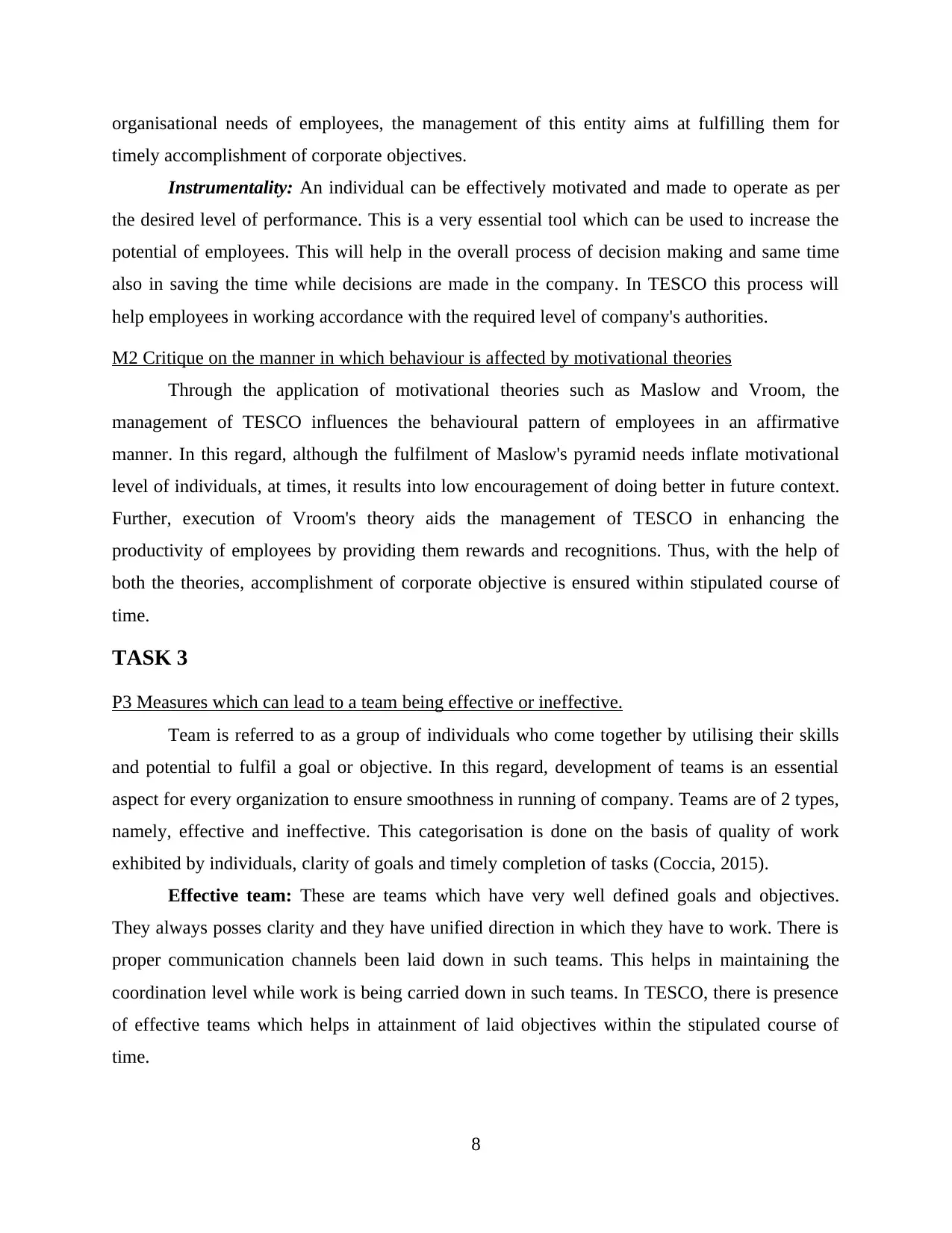
organisational needs of employees, the management of this entity aims at fulfilling them for
timely accomplishment of corporate objectives.
Instrumentality: An individual can be effectively motivated and made to operate as per
the desired level of performance. This is a very essential tool which can be used to increase the
potential of employees. This will help in the overall process of decision making and same time
also in saving the time while decisions are made in the company. In TESCO this process will
help employees in working accordance with the required level of company's authorities.
M2 Critique on the manner in which behaviour is affected by motivational theories
Through the application of motivational theories such as Maslow and Vroom, the
management of TESCO influences the behavioural pattern of employees in an affirmative
manner. In this regard, although the fulfilment of Maslow's pyramid needs inflate motivational
level of individuals, at times, it results into low encouragement of doing better in future context.
Further, execution of Vroom's theory aids the management of TESCO in enhancing the
productivity of employees by providing them rewards and recognitions. Thus, with the help of
both the theories, accomplishment of corporate objective is ensured within stipulated course of
time.
TASK 3
P3 Measures which can lead to a team being effective or ineffective.
Team is referred to as a group of individuals who come together by utilising their skills
and potential to fulfil a goal or objective. In this regard, development of teams is an essential
aspect for every organization to ensure smoothness in running of company. Teams are of 2 types,
namely, effective and ineffective. This categorisation is done on the basis of quality of work
exhibited by individuals, clarity of goals and timely completion of tasks (Coccia, 2015).
Effective team: These are teams which have very well defined goals and objectives.
They always posses clarity and they have unified direction in which they have to work. There is
proper communication channels been laid down in such teams. This helps in maintaining the
coordination level while work is being carried down in such teams. In TESCO, there is presence
of effective teams which helps in attainment of laid objectives within the stipulated course of
time.
8
timely accomplishment of corporate objectives.
Instrumentality: An individual can be effectively motivated and made to operate as per
the desired level of performance. This is a very essential tool which can be used to increase the
potential of employees. This will help in the overall process of decision making and same time
also in saving the time while decisions are made in the company. In TESCO this process will
help employees in working accordance with the required level of company's authorities.
M2 Critique on the manner in which behaviour is affected by motivational theories
Through the application of motivational theories such as Maslow and Vroom, the
management of TESCO influences the behavioural pattern of employees in an affirmative
manner. In this regard, although the fulfilment of Maslow's pyramid needs inflate motivational
level of individuals, at times, it results into low encouragement of doing better in future context.
Further, execution of Vroom's theory aids the management of TESCO in enhancing the
productivity of employees by providing them rewards and recognitions. Thus, with the help of
both the theories, accomplishment of corporate objective is ensured within stipulated course of
time.
TASK 3
P3 Measures which can lead to a team being effective or ineffective.
Team is referred to as a group of individuals who come together by utilising their skills
and potential to fulfil a goal or objective. In this regard, development of teams is an essential
aspect for every organization to ensure smoothness in running of company. Teams are of 2 types,
namely, effective and ineffective. This categorisation is done on the basis of quality of work
exhibited by individuals, clarity of goals and timely completion of tasks (Coccia, 2015).
Effective team: These are teams which have very well defined goals and objectives.
They always posses clarity and they have unified direction in which they have to work. There is
proper communication channels been laid down in such teams. This helps in maintaining the
coordination level while work is being carried down in such teams. In TESCO, there is presence
of effective teams which helps in attainment of laid objectives within the stipulated course of
time.
8
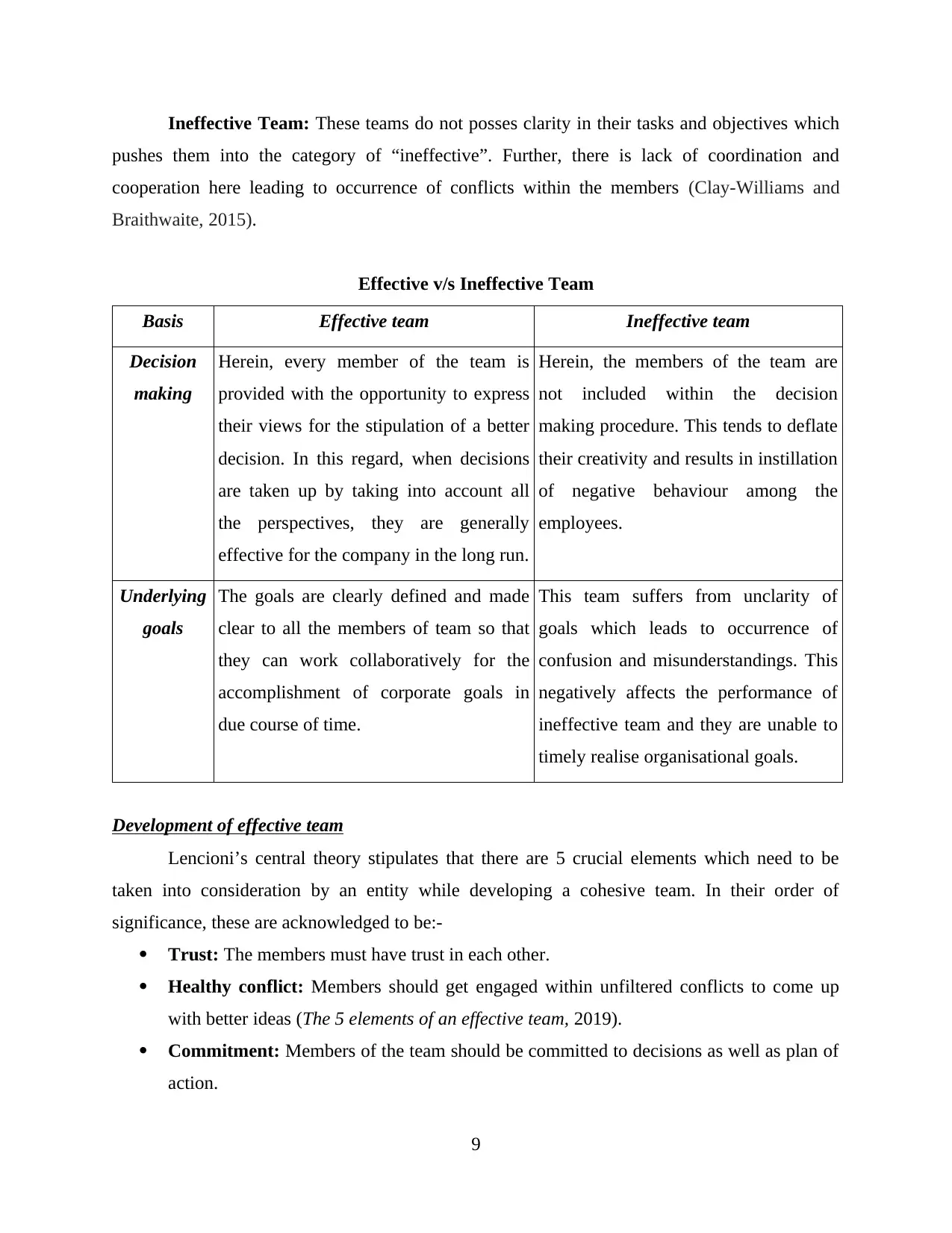
Ineffective Team: These teams do not posses clarity in their tasks and objectives which
pushes them into the category of “ineffective”. Further, there is lack of coordination and
cooperation here leading to occurrence of conflicts within the members (Clay-Williams and
Braithwaite, 2015).
Effective v/s Ineffective Team
Basis Effective team Ineffective team
Decision
making
Herein, every member of the team is
provided with the opportunity to express
their views for the stipulation of a better
decision. In this regard, when decisions
are taken up by taking into account all
the perspectives, they are generally
effective for the company in the long run.
Herein, the members of the team are
not included within the decision
making procedure. This tends to deflate
their creativity and results in instillation
of negative behaviour among the
employees.
Underlying
goals
The goals are clearly defined and made
clear to all the members of team so that
they can work collaboratively for the
accomplishment of corporate goals in
due course of time.
This team suffers from unclarity of
goals which leads to occurrence of
confusion and misunderstandings. This
negatively affects the performance of
ineffective team and they are unable to
timely realise organisational goals.
Development of effective team
Lencioni’s central theory stipulates that there are 5 crucial elements which need to be
taken into consideration by an entity while developing a cohesive team. In their order of
significance, these are acknowledged to be:-
Trust: The members must have trust in each other.
Healthy conflict: Members should get engaged within unfiltered conflicts to come up
with better ideas (The 5 elements of an effective team, 2019).
Commitment: Members of the team should be committed to decisions as well as plan of
action.
9
pushes them into the category of “ineffective”. Further, there is lack of coordination and
cooperation here leading to occurrence of conflicts within the members (Clay-Williams and
Braithwaite, 2015).
Effective v/s Ineffective Team
Basis Effective team Ineffective team
Decision
making
Herein, every member of the team is
provided with the opportunity to express
their views for the stipulation of a better
decision. In this regard, when decisions
are taken up by taking into account all
the perspectives, they are generally
effective for the company in the long run.
Herein, the members of the team are
not included within the decision
making procedure. This tends to deflate
their creativity and results in instillation
of negative behaviour among the
employees.
Underlying
goals
The goals are clearly defined and made
clear to all the members of team so that
they can work collaboratively for the
accomplishment of corporate goals in
due course of time.
This team suffers from unclarity of
goals which leads to occurrence of
confusion and misunderstandings. This
negatively affects the performance of
ineffective team and they are unable to
timely realise organisational goals.
Development of effective team
Lencioni’s central theory stipulates that there are 5 crucial elements which need to be
taken into consideration by an entity while developing a cohesive team. In their order of
significance, these are acknowledged to be:-
Trust: The members must have trust in each other.
Healthy conflict: Members should get engaged within unfiltered conflicts to come up
with better ideas (The 5 elements of an effective team, 2019).
Commitment: Members of the team should be committed to decisions as well as plan of
action.
9
⊘ This is a preview!⊘
Do you want full access?
Subscribe today to unlock all pages.

Trusted by 1+ million students worldwide
1 out of 20
Related Documents
Your All-in-One AI-Powered Toolkit for Academic Success.
+13062052269
info@desklib.com
Available 24*7 on WhatsApp / Email
![[object Object]](/_next/static/media/star-bottom.7253800d.svg)
Unlock your academic potential
Copyright © 2020–2026 A2Z Services. All Rights Reserved. Developed and managed by ZUCOL.





